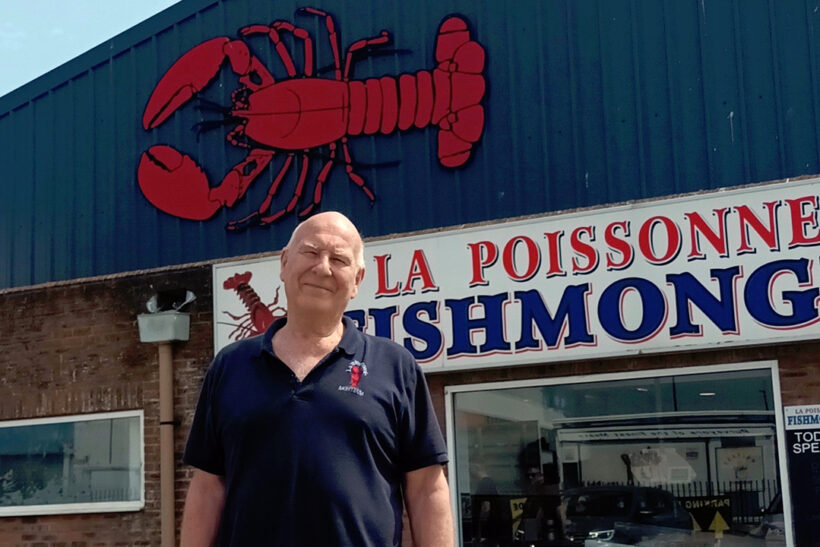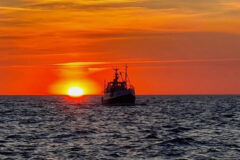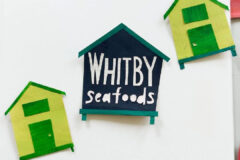Share a day in the life of a Shoreham fish merchant
“I’d rather you’d asked me about a day in the life of Jim Partridge when I was in Sri Lanka, and being much more practical, than visiting the current set-up and my daily routine here in Shoreham!” was the greeting Fishing News received when visiting the owner of Monteum Ltd.
Jim’s business includes selling fish to both retail and wholesale markets, exporting to Europe, and the making of specialist crab and lobster pots. His office is above premises which are part workshop, part gear store, offices, pot factory, crab pounds, landing jetty – and with a forward-facing retail shop which saw a steady stream of customers during our conversation.
“I donated 12 boats – three each to four different landing sites – in remote Tamil communities, after the 2004 tsunami, helping the Methodist Church there make the most of the small funds they had to get fishing communities up and running again.
“That was a real job. This week you’ll be finding me mainly dealing with paperwork, every kind under the sun. I actually took a full-time course and qualified as an industrial safety officer a few years back to help in completing the different assessments and records I need to keep across the different businesses here.”

“I’ve got two static-gear boats. This one is a new build that is currently being fitted out by Paul Foulis of Sovereign Workboats. The second is tied up at the moment, as despite the huge drop in boats in the local fleet, we’re struggling to find crew. It doesn’t help that we’re unable to pursue some of the fisheries the boat was built for, such as ring-netting, due to local regulations – despite the fact that originally I had written confirmation from the IFCA that the boat could use this method locally. The inshore fleet in England is now subject to a raft of regulation and control that no one would have dreamed of when I started in the industry.”
Jim’s first venture into the industry was as an eight-year- old, fishing out of Shoreham with a second-hand trammel net. “I was fishing full-time as soon as I was able, mainly the Channel but some successful potting out of Ramsgate. I fished out of Fraserburgh for a while, being taught trawling by Buchan Strachan, and then tried my hand in Brittany and Spain to learn about ring-netting.
“I also set up a shellfish business, building lobster pounds and exporting to the Continent. My day-to-day work sees me covering a wide range of businesses here now. We started at the site here in 1983 from scratch, and had some great years, but more recently we’ve diversified from the fishing business to survive, basically, after some golden years when fishing was the only game in town.
“At its height, I had trucks going over to Ireland, and we had an amazing 265 boats on the books, though many of them were small part-timers. This is now much scaled down. I was pro-Brexit, but I could see the chaos which was going to descend on the live export business, and scaled right back.
“Now the tanks are for local sales – and sadly, even the sale of some crab to retail outlets west of Shoreham who can’t get enough supply from their local boats. No one knows the exact reasons, although contaminated dredge spoils tipped into the East Solent from the dredging of Portsmouth harbour is certainly a major part of the problem. We’re seeing a complete dearth of crab and lobster now across huge swathes of ground, fishermen reporting dying crab in their pots.
“Likewise, the kelp that once dominated here is largely gone. It’s not come back in the areas where trawling has been banned, and clearly there is much more than mobile gear that is the problem here – we even see licensed dredge spoils dumping into an MPA, which I find unbelievable.”
Jim is also an active representative of the local industry, which adds to his workload. “I don’t have any meetings today, but in any one week, I’ll have some sort of meeting to attend, from the Kelp Group, to the Sussex IFCA meetings, where I’m a member, through to other local user groups.
“Many of these meetings are frustrating, but after 74 years I feel I ought to turn up and make my voice heard. Inshore fishermen are taking 20% of the fish – less than that – but are subject to 80% of the regulation, when in my view, little tangible benefit will be had until regulation beyond six miles protects the stocks that inshore fishermen rely on.
“Much of my day now involves liaising with the various different businesses that lease parts of the set-up now, or that I’ve diversified into. We used to buy our pots from a chap in Portland, George Hurst. When we heard he was retiring, we bought the business, as we didn’t want to lose a source of such great gear. We make pots now in the workshop, for local sale, and also export to customers in Europe.
“One Dutch customer worked as crew on a beam trawler that towed away a fleet of our gear. He fishes for lobster in the summer from the Dutch coast, and was so impressed with the performance of the pots that he is now buying gear legitimately from us!
“On the day-to-day work, I am helped by Peter Huxtable, who is part of the company and has worked with me since 1981. He received an MBE after 21 years as Shoreham lifeboat cox. “And then we have my daughter Alex, who is taking on an increasing part of the workload, giving me a bit of time to get out and about.
“Day-to-day contact with our customers and fishermen is still one of the key parts of the job, and one that I enjoy.”
This story was taken from the latest issue of Fishing News. For more up-to-date and in-depth reports on the UK and Irish commercial fishing sector, subscribe to Fishing News here or buy the latest single issue for just £3.30 here.
Sign up to Fishing News’ FREE e-newsletter here.






